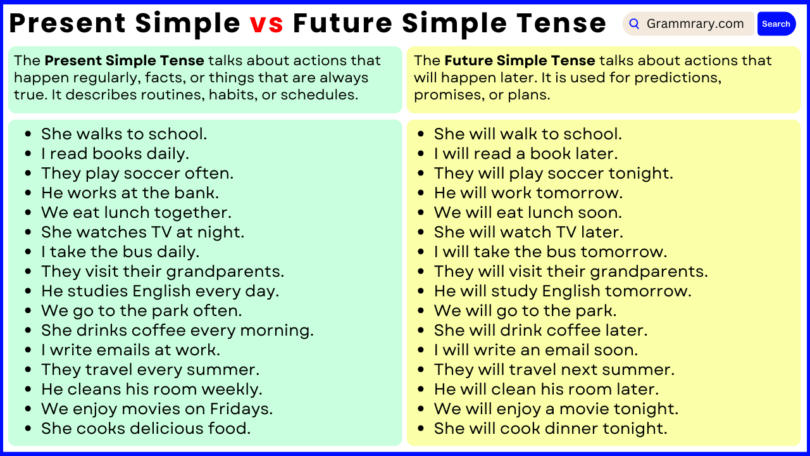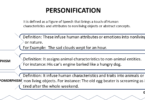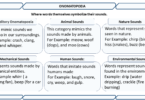What is the Present Simple Tense?
The Present Simple Tense is used to describe actions that are regular, habitual, universal, or factual. It talks about events that happen in the present and often repeat over time.
Structure of Present Simple Tense
- Affirmative: Subject + Base Verb (s/es for 3rd person singular)
- Negative: Subject + Do/Does + Not + Base Verb
- Interrogative: Do/Does + Subject + Base Verb?
Examples of Present Simple Tense
| Type | Example Sentence |
|---|---|
| Affirmative | She works every day. |
| Negative | He does not like coffee. |
| Interrogative | Do they play football on Fridays? |
What is the Future Simple Tense?
The Future Simple Tense is used to describe actions that will happen in the future. It is often used for predictions, promises, offers, and decisions made at the moment of speaking.
Structure of Future Simple Tense
- Affirmative: Subject + Will + Base Verb
- Negative: Subject + Will Not (Won’t) + Base Verb
- Interrogative: Will + Subject + Base Verb?
Examples of Future Simple Tense
| Type | Example Sentence |
|---|---|
| Affirmative | She will visit us tomorrow. |
| Negative | They will not (won’t) come today. |
| Interrogative | Will he join the meeting? |
Key Differences Between Present Simple vs Future Simple Tense
Understanding the distinction between these two tenses is crucial. The Present Simple refers to current or regular actions, while the Future Simple focuses on actions yet to occur.
| Aspect | Present Simple | Future Simple |
|---|---|---|
| Time of Action | Present | Future |
| Use | Habits, facts, routines | Predictions, promises, decisions |
| Example Sentence | “She teaches English every day.” | “She will teach English tomorrow.” |
When to Use Present Simple Tense
1. Repeated Actions or Routines
Use the Present Simple for activities that happen regularly.
- Example: I drink coffee every morning.
2. Universal Facts
State truths or facts that do not change.
- Example: The sun rises in the east.
3. Scheduled Events
Discuss timetables or schedules.
- Example: The train leaves at 7 p.m.
When to Use Future Simple Tense
1. Predictions
Make predictions about the future.
- Example: It will rain tomorrow.
2. Promises or Assurances
Use Future Simple for commitments.
- Example: I will help you with your homework.
3. Decisions Made Instantly
For immediate decisions or offers.
- Example: I’ll call her right now.
Common Mistakes and Tips about Present Simple vs Future Simple Tense
1. Using Present Simple for Future Events
- Incorrect: She goes to the party tomorrow.
- Correct: She will go to the party tomorrow.
2. Forgetting Subject-Verb Agreement in Present Simple
- Incorrect: He walk every day.
- Correct: He walks every day.
Learn Present Simple vs Future Simple Tense Example Sentences
| Present Simple | Future Simple |
|---|---|
| I wake up early every day. | I will wake up early tomorrow. |
| She goes to school by bus. | She will go to school by bus next week. |
| We eat lunch at 1 PM. | We will eat lunch after the meeting. |
| He drinks coffee in the morning. | He will drink tea in the evening. |
| They play football every weekend. | They will play football next Saturday. |
| The shop opens at 9 AM. | The shop will open at 10 AM tomorrow. |
| I read books in my free time. | I will read a new book tonight. |
| She visits her grandma on Sundays. | She will visit her grandma next Sunday. |
| We watch TV after dinner. | We will watch a movie tomorrow night. |
| He writes letters to his friend. | He will write an email to his friend soon. |
| They clean the house on Saturdays. | They will clean the house next weekend. |
| The sun rises in the east. | The sun will rise at 6 AM tomorrow. |
| I always drink water before meals. | I will drink juice after lunch. |
| She speaks English fluently. | She will speak to the manager later. |
| We walk to the park every evening. | We will walk to the beach next time. |
| He fixes his bike on weekends. | He will fix his bike tomorrow. |
| They buy groceries every Friday. | They will buy groceries after work. |
| The train arrives at 8 AM. | The train will arrive at 9 AM tomorrow. |
| I take a shower every morning. | I will take a shower before dinner. |
| She bakes cookies for the kids. | She will bake a cake for the party. |
You may also like










